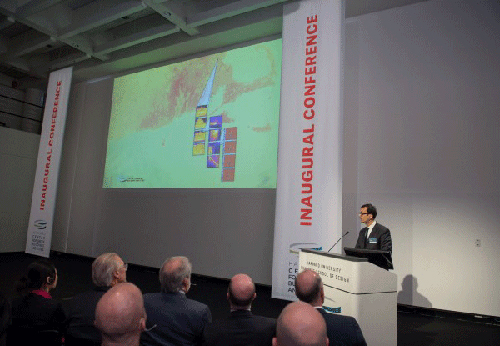Harvard Magazine: The Challenge of Greener Cities
11.12.2014
The Harvard Center for Green Buildings and Cities (CBGC) held its inaugural Challenge Conference on Friday, bringing together leaders from industry and academia to discuss pressing questions for the fields of sustainability and design, ranging from why holistic mapping tools could help developers think on a more regional scale, to how to implement promising new solar technology. The conference helped delineate a wide-reaching research agenda for the new center, setting forth what professor of architectural technology Ali Malkawi, its founding director, called its “very ambitious” mission: to “rethink conventions of design practice and fundamentally shift the ways humans use energy in the long term.”
The day began with an acknowledgment of the enormity of the problems at hand. In his opening remarks, Williams professor of urban planning and design Jerold Kayden called climate change “the central issue—the existential issue—of our time.” Those who think about and create buildings and cities play a large role in these questions, because constructing, heating, cooling, and lighting the built environment consume huge portions of the world’s energy output. By bringing together interdisciplinary teams of engineers, designers, business leaders, and other potential stakeholders, CGBC can “show people how to make buildings and cities sustainable while spending less,” Malkawi said. “I believe that what is possible today is limited not by economics, politics, culture, costs, or material, but our imagining of what might be possible.”
The University announced the creation of CGBC last December as one of three initiatives supported by Evergrande Group, one of the largest real-estate developers in China. Members of Evergrande’s management team, including founder and chairman Hui Ka Yan, were present for Friday’s festivities, helping to officially inaugurate the center after 11 months of preparatory work. University president Drew Faust opened the conference by reiterating her commitment to tackling climate change through intensive research (a call she has made repeatedly in campus debates over divestment from companies that produce fossil fuels). “Universities,” she said, “have a special obligation and accountability to the future, to the long view needed to anticipate and alter the trajectory of climate change.”
Read the entire article on Harvard Magazine.

